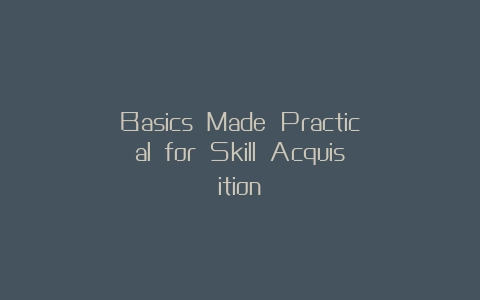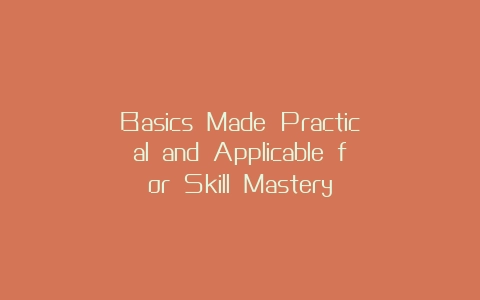How to Begin Your Path to Skill Excellence Have You Ever Stood at the Starting Line of a New Skill, Feeling Overwhelmed and Unsure Where to Begin? Let’s be real—have you ever thought, “Why does this feel so hard?” or “How do I even take the first step?” Have you ever felt like everyone else has already mastered the basics while you’re still trying to figure out the fundamentals? If so, you’re not alone. Many of us feel stuck before we’ve even taken the first step. But here’s the good news: your path to skill excellence doesn’t have to be daunting. It’s about breaking it down into manageable steps and building momentum over time. In this article, I’ll guide you through the first steps to mastering skills—a roadmap to help you get started and stay focused. Let’s dive in! Why Starting Feels Like Wrestling an Octopus Starting something new can feel overwhelming for several reasons. Let’s break them down: 1. Fear of the Unknown The unknown is a powerful force. ️ What if I fail? What if I embarrass myself? These thoughts can creep in and stop you in your tracks. But here’s the truth: Everyone starts somewhere. Even the most skilled individuals were beginners once. Self-Question-and-Answer: Q: How do I overcome the fear of the unknown? A: Start small. Instead of focusing on the entire mountain, focus on the first rock. For example, if you want to learn a new language, start with basic greetings like “Hello” and “Thank you.” Celebrate that small win—it’s progress. 2. Lack of Clarity…
Work Habits That Improve Emotional Intelligence: Connect on a Deeper Level Are You Struggling to Connect with Your Colleagues? Ever felt like your workplace interactions could use a little more... warmth? Maybe you’re delivering the perfect PowerPoint slides, but it feels like no one’s really listening. Have you ever wondered if there’s a way to not just do your job, but to truly connect with the people around you? Enter emotional intelligence (EQ)—the secret sauce that can transform your work life. In this article, we’ll explore 20 work habits that improve emotional intelligence, helping you build stronger relationships, foster collaboration, and connect on a deeper level with your colleagues. Let’s dive in! Why Emotional Intelligence Matters at Work Before we get into the tips, let’s talk about why EQ is so crucial. Here’s the deal: Better Communication: High EQ helps you understand and convey emotions more effectively. Stronger Relationships: It fosters trust and empathy, making connections with colleagues more meaningful. Conflict Resolution: Understanding emotions can help you navigate workplace tensions smoothly. Leadership Potential: Leaders with high EQ are more likely to inspire and motivate their teams. Personal Growth: Developing EQ can help you better understand yourself and your reactions. Core Concepts: Work Habits That Improve Emotional Intelligence 1. Practice Active Listening Why It Works: Active listening is the cornerstone of emotional intelligence. It shows that you value others’ perspectives. How to Do It: - Focus entirely on the speaker without interruptions. - Use verbal cues like “I see” or “That makes sense” to show you’re engaged. - Paraphrase what you…
Basics Made Simple for Everyone Have You Ever Felt Overwhelmed by the Idea of Learning Something New? Let’s be real—have you ever stared at a blank page, wondering where to even begin? Have you ever thought, “Why does this feel so hard?” or “How do I even take the first step?” If so, you’re not alone. Many of us feel stuck before we’ve even started. But here’s the good news: learning the basics doesn’t have to be intimidating. It’s about breaking it down into manageable steps and building momentum over time. In this article, I’ll guide you through the basics made simple for everyone. Let’s dive in! Why Starting Feels Like Wrestling an Octopus Starting something new can feel overwhelming for several reasons. Let’s break them down: 1. Fear of the Unknown The unknown is a powerful force. ️ What if I fail? What if I embarrass myself? These thoughts can creep in and stop you in your tracks. But here’s the truth: Everyone starts somewhere. Even the most skilled individuals were beginners once. Self-Question-and-Answer: Q: How do I overcome the fear of the unknown? A: Start small. Instead of focusing on the entire mountain, focus on the first rock. For example, if you want to learn a new language, start with basic greetings like "Hello" and "Thank you." Celebrate that small win—it’s progress. 2. Lack of Clarity Another barrier to starting is not knowing where to begin. You might have a vague idea of what you want to achieve, but without a clear roadmap, it’s easy to feel stuck.…
Work Habits That Will Make You a Morning Person (Even If You’re Not) Are You the Type of Person Who Hits Snooze 10 Times Every Morning? Let’s be real—most of us are. It’s easy to stick to the title of “night owl” when mornings feel like dragging yourself out of bed. But here’s the thing: becoming a morning person isn’t about forcing yourself to wake up early; it’s about building a routine that makes mornings enjoyable and productive. Have you ever wondered how some people seem to wake up with endless energy, while you’re groggily scrolling through your phone? Spoiler alert: it’s not magic. It’s about smart habits and a little bit of mindset shift. In this article, we’ll break down the work habits that can transform you into a morning person (or at least a productive one). Let’s dive in! Why Becoming a Morning Person is a Game-Changer Before we jump into the nitty-gritty, let’s ask a few key questions: - Why is it important to start your day earlier? Mornings are a fresh start. You have fewer distractions, and you can focus on your goals before the chaos of the day begins. - What are the benefits of being a morning person? Morning people tend to be more productive, better at time management, and have a sense of calm throughout the day. - How can I make mornings work for me if I’m not a natural early riser? Let’s explore. 1. Start Small: Don’t Try to Wake Up at 5 AM Overnight Why It Works Trying to drastically…
Basics You Must Know: Building Your Foundation for Success Have You Ever Felt Overwhelmed by Starting Something New? Let’s be real—beginning a new journey can feel like trying to navigate a maze without a map. Whether you're learning a new skill, starting a business, or pursuing a personal goal, the sheer number of unknowns can be daunting. Have you ever thought, "Where do I even begin?" or "What’s the first step I should take?" If so, you’re not alone. Many of us feel stuck before we’ve even started because we don’t know the basics. But here’s the good news: you don’t need to know everything to begin. You just need to understand the core fundamentals. In this article, I’ll guide you through the essentials you must know to start effectively. Let’s dive in! Why Starting Feels Like Wrestling an Octopus Starting something new can feel overwhelming for several reasons. Let’s break them down: 1. Fear of the Unknown The unknown is a powerful force. ️ What if I fail? What if I’m not good enough? These thoughts can creep in and stop you in your tracks. But here’s the truth: Everyone starts somewhere. Even the most successful people faced fear when they began their journeys. Self-Question-and-Answer: Q: How do I overcome the fear of the unknown? A: Start small. Instead of focusing on the entire mountain, focus on the first rock. For example, if you want to learn a new language, start with basic phrases like "Hello" and "Thank you." Celebrate that small win—it’s progress. 2. Lack of Clarity Another…
Work Habits That Will Make You Indispensable at Work Are You Making the Most of Your Work Potential? Let’s be real for a second. We all want to be the person everyone in the office leans on during crunch time, the go-to problem solver, and the one whose work is so impeccable that everyone wants to collaborate with us. But how do you become that indispensable employee? Is it just about working harder, or is there a smarter, more strategic way to stand out? In this article, we’ll explore 10 work habits that can elevate your career and make you indispensable at work. From mastering your time to building relationships, these strategies are backed by psychology, productivity experts, and real-world success stories. Let’s dive in and unlock your full potential! 1. Prioritize with Precision: Be a Master of Time Management Why It Matters Time is your most valuable resource. The ability to prioritize effectively can make or break your productivity. When you focus on what truly matters, you not only save time but also reduce stress and avoid burnout. How It Works Use the Eisenhower Matrix: Categorize tasks into urgent/important, important/not urgent, urgent/not important, and neither. Focus on the first category first. Tackle the Hardest Tasks First: Your brain is freshest in the morning. Use this time for the most demanding work. Set Clear Goals: Know your top priorities for the day, week, and month. Example If you’re a project manager, prioritize client deadlines over internal emails. Pro Tip: Use tools like Trello or Asana to organize your tasks visually.…
Work Habits That Will Skyrocket Your Professional Growth Are You Stuck in a Rut at Work? Let’s Fix That! Let’s be real for a second—most of us spend a significant chunk of our lives working. Whether you’re grinding away in a corporate office, freelancing from your kitchen table, or running your own business, the way you approach your work can make or break your professional growth. Have you ever wondered what sets apart high achievers from the rest of the pack? Spoiler alert: it’s not just about raw talent—it’s about work habits. In this article, we’ll dive into 10 game-changing work habits that can help you level up your career. From time management to personal development, these strategies are designed to help you skyrocket your professional growth. Let’s get started! 1. Master the Art of Time Management Why It Matters: Time is your most valuable asset. Without good time management, you’ll constantly feel overwhelmed, leading to burnout and decreased productivity. How It Works: - Prioritize: Focus on tasks that align with your goals. Use the Eisenhower Matrix to categorize tasks into urgent/important, important/not urgent, urgent/not important, and neither. - Batch Tasks: Group similar tasks together (e.g., responding to emails, making calls) to avoid context-switching. - Use Tools: Leverage tools like Trello, Notion, or Google Calendar to organize your schedule and track progress. Example Q&A: Q: How do I avoid procrastination? A: Break tasks into smaller, manageable steps. Start with the easiest one to build momentum. Key Insight: Time management isn’t just about being busy—it’s about being strategic with your time.…
Time Management for Optometrists: Examine Eyes and Manage Practice Are You an Optometrist Feeling Stretched Too Thin? Imagine this: you’re juggling patient appointments, running diagnostic tests, managing inventory, handling administrative tasks, and still trying to find time to catch your breath. Does that sound like your day? As an optometrist, you’re not just a healthcare provider—you’re also a small business owner. Balancing patient care and practice management can feel like walking a tightrope. But here’s the good news: you can manage your time effectively without sacrificing the quality of care you provide. In this article, we’ll explore 20 time management strategies for optometrists that will help you streamline your practice, reduce stress, and improve your work-life balance. Let’s dive in! Why Time Management Matters for Optometrists Before we get into the tips, let’s talk about why time management is critical for optometrists. Improved Patient Care: When you manage your time well, you can dedicate more focus to each patient, leading to better outcomes. Reduced Stress: A well-organized schedule reduces the chaos and burnout that often come with running a practice. Higher Efficiency: Efficient time management means you can see more patients without compromising quality. Better Work-Life Balance: Let’s face it—you didn’t become an optometrist just to work endless hours. Time management helps you carve out time for yourself and your loved ones. Core Concepts: Time Management Tips for Optometrists 1. Start Your Day with a Plan Why It Works: A clear plan sets the tone for your day and ensures you stay on track. How to Use It: - Create…
Basics Made Practical for Skill Acquisition Have You Ever Felt Like You’re Stuck in a Loop of Overthinking? Let’s be real—have you ever thought, “Why does this feel so hard?” or “How do I even get started?” Have you ever felt like everyone else is mastering skills while you’re still trying to figure out the basics? If so, you’re not alone. Many of us feel stuck before we’ve even taken the first step. But here’s the good news: you don’t need to be perfect to start. You just need to start. In this article, I’ll break down the basics of skill acquisition into practical, actionable steps. Let’s dive in! Why Starting Feels Like Wrestling an Octopus Starting something new can feel overwhelming for several reasons. Let’s break them down: 1. Fear of the Unknown The unknown is a powerful force. ️ What if I fail? What if I embarrass myself? These thoughts can creep in and stop you in your tracks. But here’s the truth: Everyone starts somewhere. Even the most skilled individuals were beginners once. Self-Question-and-Answer: Q: How do I overcome the fear of the unknown? A: Start small. Instead of focusing on the entire mountain, focus on the first rock. For example, if you want to learn a new language, start with basic greetings like “Hello” and “Thank you.” Celebrate that small win—it’s progress. 2. Lack of Clarity Another barrier to starting is not knowing where to begin. You might have a vague idea of what you want to achieve, but without a clear roadmap, it’s easy to…
Basics Made Practical and Applicable for Skill Mastery Have You Ever Felt Like You're Stuck at the Starting Line? Let’s be real—have you ever thought, “Why does this feel so hard?” or “How do I even get started?” Have you ever felt like everyone else is zooming ahead while you’re still trying to figure out the basics? If so, you’re not alone. Many of us feel stuck before we’ve even taken the first step. But here’s the good news: mastering skills doesn’t require some magical talent or a lightning bolt of inspiration. It’s about starting small, staying consistent, and making the basics practical and applicable to your daily life. In this article, I’ll guide you through the core steps to start building your skill mastery today. Let’s dive in! Why Starting Feels Like Wrestling an Octopus Starting something new can feel overwhelming for several reasons. Let’s break them down: 1. Fear of the Unknown The unknown is a powerful force. ️ What if I fail? What if I embarrass myself? These thoughts can creep in and stop you in your tracks. But here’s the truth: Everyone starts somewhere. Even the most skilled individuals were beginners once. Self-Question-and-Answer: Q: How do I overcome the fear of the unknown? A: Start small. Instead of focusing on the entire mountain, focus on the first rock. For example, if you want to learn a new language, start with basic greetings like "Hello" and "Thank you." Celebrate that small win—it’s progress. 2. Lack of Clarity Another barrier to starting is not knowing where to begin.…









